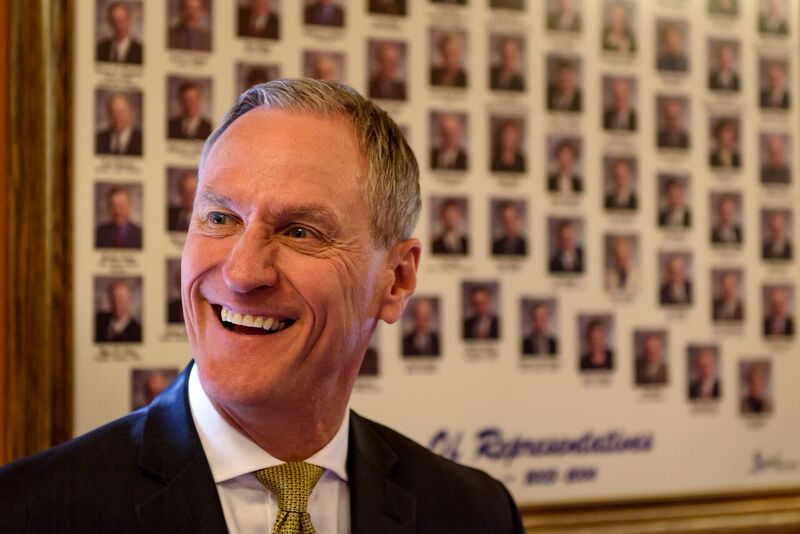Just a few days after Michigan Republicans walked back their controversial plan to exempt several majority-white counties from its proposed Medicaid work requirement after a widespread backlash and accusations of racism, South Dakota unveiled its own proposal that wades into a similar legal and political fight.
The draft waiver the state released this week proposes the implementation of a Medicaid work requirement for a five-year period only in the state’s two most populous counties, Minnehaha and Pennington, home to Sioux Falls and Rapid City respectively. While the both the state and its largest cities are overwhelmingly white, more than two-thirds of the state’s black residents and nearly half of the state’s Hispanic residents live in the two counties where the work requirements would take effect.
The state’s waiver justifies singling out the two counties by arguing that they were selected “based on population and access to employment and training resources,” and says other counties may be added “based on the initial outcomes of the pilot.”
If residents in those two counties who depend on Medicaid aren’t able to prove that they’re spending at least 80 hours per month working, studying, or searching for a job, they could lose their health care coverage.
South Dakota Gov. Dennis Daugaard announced he would be pursuing the waiver back in January, saying the new rules would “connect those who can work with jobs that give them that sense of self-worth and accomplishment.” Because South Dakota never expanded Medicaid under Obamacare, the work requirement would be imposed upon people in so-called “traditional Medicaid,” which in South Dakota means people earning up to 58 percent of the federal poverty level.
South Dakota’s waiver also steps squarely into the fight over whether Native Americans should be exempt from the new requirements. American Indian tribes and their supporters in Congress on both sides of the aisle have argued that it would be a violation of tribal sovereignty to force the work requirements on them, but the Trump administration has asserted that exempting Native Americans would be granting an illegal racial preference, and has empowered states to make the call.
South Dakota, which has the fourth-highest percentage of Native Americans in the country, writes that when they consulted with Native American groups while drafting the waiver: “Some of the tribes expressed concern or opposition to the demonstration and requested an exemption for American Indians.” Neither those concerns nor the threat of legal action, however, were not enough to dissuade the state from plowing ahead.
“The counties included in the pilot do not include Indian reservations,” the waiver notes. “In addition, the State’s understanding is that CMS has determined that it cannot legally exempt American Indians.”
But Jerilyn Church, the CEO of the Great Plains Tribal Chairmen’s Health Board (GPTCHB) in South Dakota, told state officials in a conference call in April that by not granting American Indians an exemption, they were pursuing a policy that was both harmful and illegal.
“Medicaid is an extension of the treaty obligation,” Church said, according to the meeting minutes. “Most American Indians want to work; but, on the reservation there is limited opportunity. … Data is clear that it is harder for American Indians to obtain jobs off the reservation compared to other populations.”







Does this sentiment apply to the wealthy scions of the 1% who benefit mightily from a tax code designed around them?
"And lo, Jesus said unto his brethren, ‘Feel not bad for the poor, for they have chosen their lot in life. Only the richest amongst you will be chosen to be at the side of Christ in Heaven.’ "
-The New-New Testament, King Trump Version.
Republicans really don’t oppose government welfare.
Republicans are the biggest supporters of welfare programs… for themselves.
Yet Michigan, South Dakota and a few other states have looked to find ways to exempt rural, mainly White counties from the work rules. Wait, why am I falling into the trap? The GOP used the idea of county unemployment as a way to get around a direct attack on urban (mainly minority) areas. Yes, Michigan backed off, but I expect Republicans to try again to find a way to exempt their voters from this rule.
We saw this in North Carolina as McCrory was leaving office- the GOP passes voting reforms and the courts rule the GOP used race as a substitute for party allifiation. What Republicans are willing to do is punish anyone they don’t see as an ally. The idea of big tent Republicanism died an ugly death a while ago, and now the GOP is getting older, whiter and less tolerant of anything not them.
Since the article didn’t cite the facts I would have liked to see, I looked them up–the two counties are 93% and 87% white. The state is 86% white. The situation is much different than Michigan. I am adamantly against the policy as a whole, but I think it may be hard to argue against on racial grounds.
I find it telling that that this is a tacit admission that there are not enough work training opportunities in rural areas and their solution is to not require rural people to work rather than fund work training in rural areas.